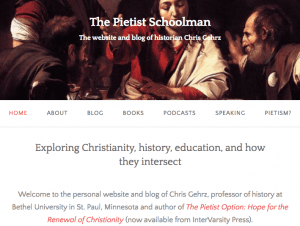I’m grateful to Kristin for having used some of her recent turns in the Anxious Bench rotation to host an important conversation about the nature of Christian scholarship. Especially important was Raully Donahue’s analysis of the “distribution problem” facing Christian scholars whose work rarely reaches Christian publics. Then last month Kristin interviewed John Hwang, who proposed ways that the Internet can help us break free of “a 500- year- old distribution model.”
As a Christian scholar who has been living out some of John’s advice for over a decade (podcasting since 2006, blogging since 2011), I thought I’d offer a few suggestions about engaging in such responses to our “distribution problem.”
Build a “tribe,” not a platform
First, don’t go into this enterprise thinking that you’re going to build a platform from which you can become a “thought leader” speaking to tens of thousands of potential book-buyers and speaking fee-payers.
But you can build an audience. In my case, it’s neither big nor insignificant.
My personal blog gets only a fraction of the 1,000+ views that constitute a typical day’s readership for Anxious Bench, but that’s in part because I blog in such a way that fosters a particularly devoted readership. I hadn’t recognized that until my dad once observed that readers usually don’t know the point of my posts until the third or fourth paragraph — which violates every rule of search engine optimization, but does cultivate something like John’s “tribe.” (A loaded term he has walked back on Twitter.) For some relatively small number of Christians, The Pietist Schoolman is as big an influence as anything else they read.
And doing all that work of blogging helped convince a major Christian publisher to put out my newest book, which was consciously aimed at providing a general Christian audience with a “usable past” that could inspire present-day renewal. Unlike other options, The Pietist Option isn’t going to show up on a New York Times bestseller list, but I know that it’s already being discussed in dozens of small groups — which seems like a typically Pietist way for ideas to spread.
(Then this winter I’ve used the same platforms to recruit readers who are contributing to a free Lenten devotional that we’ll publish electronically tomorrow. Sign up here to receive your copy!)
Don’t hold your breath waiting for institutional support
Perhaps that’s not enough to persuade you to take the plunge. Perhaps you’re instead hoping that your employer will give you incentives to blog or podcast…
Don’t hold your breath.
Now, should Christian colleges and universities follow John’s advice and develop the “operational capacity and infrastructure to support the academic staff in building personal brands/platforms”? Yes, absolutely. That strikes me as a forward-thinking example of his recommended “long-term strategies that invest in long-term assets, such as increasing their endowments and strengthening their brand.”
And there’s almost no chance that that’s going to happen.

I mean, Bethel has never put up obstacles to my forays into public scholarship. It has even recognized and celebrated that work. Incorporating podcasting into my classes helped earn me a faculty teaching award, and my colleagues were even willing to consider blogging as part of my successful application for promotion. (Though certainly not above and beyond my more traditionally published work, my extensive institutional service, or my performance in teaching a seven-course load.)
But like most Christian colleges and universities, my employer is a tuition-dependent institution faced with stiff local and regional competition for a declining student demographic. We are stuck in what John calls a “scarcity mindset.” And whatever long-term investments we make are going towards engineering, health science, and business programs. (Hence my recent search for a wealthy donor willing to invest in the humanities, arts, and social sciences.) In the near future, it’s far more likely that I’ll be teaching an additional course than that I’ll have been released to expand my outreach to the public.
Maybe some of you work in more favorable settings and can reasonably expect some kind of investment in your efforts. But if that’s the chief motivation, then I think it’s very unlikely that you’ll ever do what John suggests.
What are your intrinsic motivations?
In the end, though, no external incentive could have sustained my blogging, podcasting, and other efforts. My parting advice would be this: don’t waste the time and invite the frustration that comes with this work unless it proceeds from intrinsic motivations.

First, I’ve treated blogging and podcasting as an extension of my calling as a teacher. (“Leverage your greatest strength: teaching,” John advised. “You wouldn’t be teaching at a college if you didn’t enjoy teaching.”) In fact, I probably do my worst work as a blogger when I lose sight of that calling — e.g., when I start to forget what Rich Mouw has described as the difference between taking “prophetic stances” and “the public importance of the teaching role.”
Then second, I blog and podcast because doing so gives me the chance to “think about God in public.” It’s a risky way to proceed for a Christian scholar: with some regularity, I reveal ignorance and biases that I could probably conceal with a more traditional (and more heavily vetted) distribution model. But it helps me to make up my mind about things — and perhaps to offer a different kind of Christian witness than the angry, unthinking one we see all too often.
When I start to doubt that my online work is having any meaningful impact, I think back to something one of my readers wrote on the eve of Donald Trump’s election:
…I’m convinced that there are seeds being planted in the Church right now that will have a longer term impact on Christian engagement in political life…. Christian intellectuals are impacting the frameworks and language being used in these spaces. This comes at a time when the ‘culture war’ mentality that has dominated white evangelicalism over the past four decades seems increasingly unattractive and implausible. Who knows what kind of fruit this might bear in years to come?!














